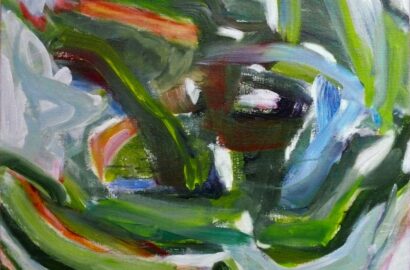October on the 101
There is so much these days
I don’t want to touch. So we skim
fast down the coast with the windows open,
but the seals, their blueblack
shadows lifting out where the waves suckle
the cliffside, remind me of this marriage.
Make of that what you will. October
is as gold & brittle as it gets in California:
the beautiful invasive species
grasses lean in breathless for the first spark.
The eucalyptus trees with their well-deep roots
drain the groundwater. It is all
amber as striking paper
desiring the head of a match. It is all
so fucking pretty. I don’t mean it to be.
It is the prettiness of endings,
and I am making one up for us
on this drive that goes
off and off into the cold deep saltwater
slosh and blueblack nothing—home.
In the next life, let’s be ravens
I say into the tuning static, and you
agree, yes, that will be the rendezvous point.
We will live above the ocean. We will pick
bones clean and each other again for partners.
But something is coming
that doesn’t belong in this family. The seals
look over their shoulders at it.
A ghost, a baby.
It is riding along in this car, some inevitable
future. Today I won’t touch it. Today
we have a rendezvous. Ahead,
the ocean peers through
the mountains like an actor through a stage curtain.
The ravens cross with their wind and their call.
A Clean, Dry Container
Crossing the Target parking lot, I felt it again: the sensation
of being an open bottle, and I walked alongside myself through
the aisles, thinking the story in past tense,
in first-person: I walked alongside myself,
the story went, and I bought the tests, and I bought dog treats and a bottle
of honey, because I wanted to pretend
I had come for necessary sundries, but then on the drive home
the sensation came back: this time
like picking out a constellation half under cloud cover: something hidden
ahead of me suggested itself when I looked up— At home,
without telling you, I took the test.
I sat in the bathroom a while, hearing my heart
and thinking about my doctorate, and how it had left me
certain the time for everything else
was over. Poetry doctor, write me a sonnet, you’d sung to me
for weeks after the defense, while I just kept prodding
the empty feeling in my brainpan,
like getting used to a fresh-pulled tooth, and with my tongue
I groped around for the voice in my head,
raw and quiet. I was thinking about the essay that made me want
to study literature, about Blade Runner and Shakespeare’s sonnets:
how the poems themselves are replicants, hijacking the readers’ wetware—
eyes, vocal cords, erogenous zones—a voice
in the brain indistinguishable
from the voice in the brain. I was thinking about it
and I was telling myself
I was thinking about it
when I decided to take the second test
more carefully, decided maybe my first rush had ripped open
a speculative future
where something was happening that would not happen.
So I went to look for the clean, dry container
the instructions called for. I went to look
for the clean, dry container, I said to myself, finding
an old yogurt pot. By then, I had already told you
everything, and back in the bathroom, I let you watch me pee
and I propped the stick in the container, and we waited.
I was thinking about getting
pregnant from a sonnet, how it would come through the eyes
and down the spinal cord to settle
in the middle, overtake the body
from there. I was thinking about gender, and how my least favorite
gender to be is lady—
as in thank the nice lady, as in give your seat to the lady, as in methinks
the lady doth protest. As in pregnant lady. I was afraid
my body would become a blank verse
that goes: too much lady lady lady lady. Another minute, you said.
In school I learned I shouldn’t say you in a poem. There are so many rules
I will never follow again
and what am I supposed to call you, anyway? It would be dishonest
to say I was thinking your name, when you are you. You are you,
I said in my head, and decided
I hate the rules. I decided I would never follow a rule again,
and I would let any little song come demonic
into me and would doctor it. I would care for
whatever possessed me, I thought. I thought
why not let whatever wants to be here
be here, in this ongoing everbroken
line. And in my head, I wrote a sonnet that went:
I have decided I will let you be
and I refused to finish it. But I knew there’d be another line, already
pressing behind the first, as you called time.
Everything is Terrifying; Tell me It’s Spring
And the world ought to be
getting warmer for a while. It’s all right for now.
Tell me the window is open,
the night is quick with rain
and we needed this. It is
months until fire season.
Tell me it is in our nature to survive
needing rain and knowing fire
will come, brewing small poisons
to bring down the rich, cutting
our hair to set the storms in motion
and worshipping the waters
that upturn their ships. In the next life, we will be
roadkill-eating birds, and the one
after that, toxin-eating mushrooms.
We will suck the radioactive
earth back into its green.
It won’t hurt
to be there, and the way we rot
will change things for the better, promise me.
We will eat the flesh
we touch together now
and we will love it even better
as we digest ourselves
and are digested. Tell me we needed this. We need this.
Tell me we can wait. Here we are
for a while in these exact bodies
and the rain is coming to quiet.
It is spring and it is
now and here we are in
love. In spite.
Author’s note: the poem “A Clean, Dry Container” includes a reference to the following work:
Yates, Julian. “More Life: Shakespeare’s Sonnet Machines.” Shakesqueer: A Queer Companion to the Complete Works of Shakespeare, ed. Madhavi Menon, Duke UP, 2011.


